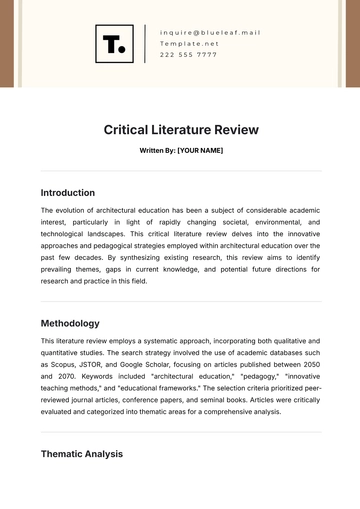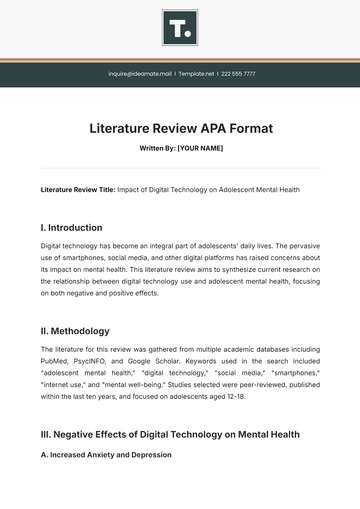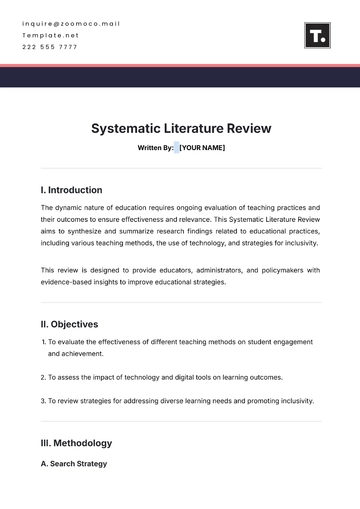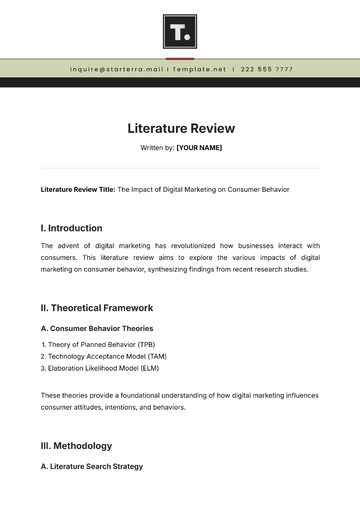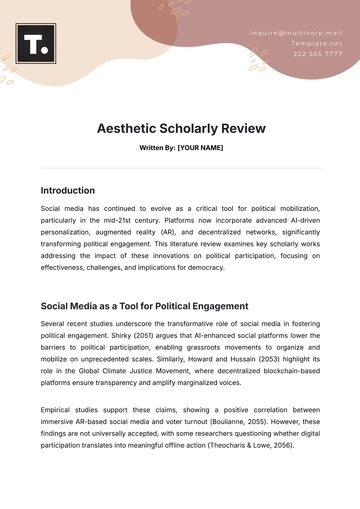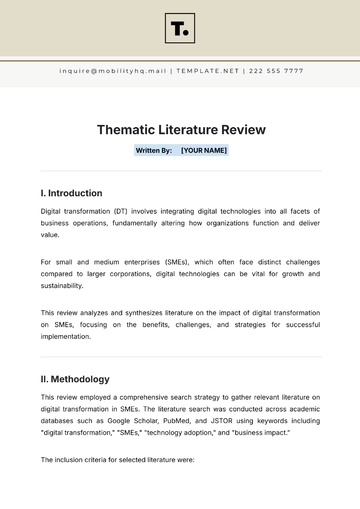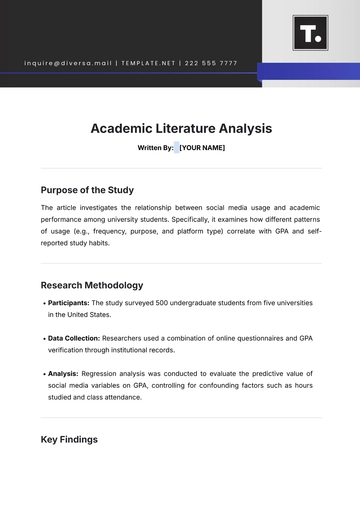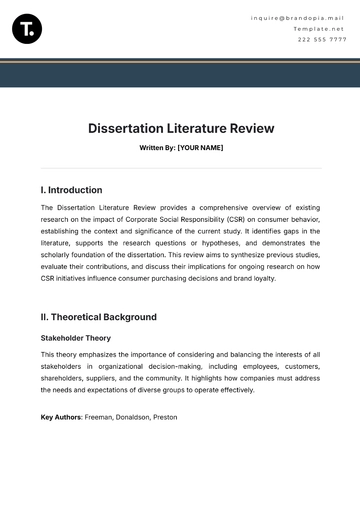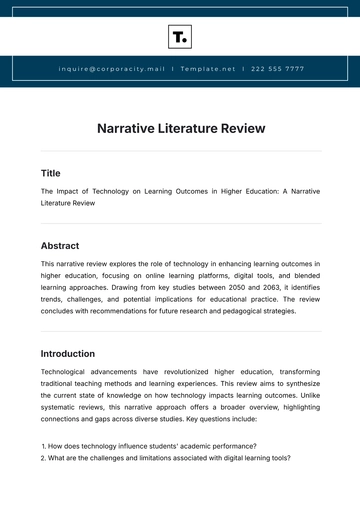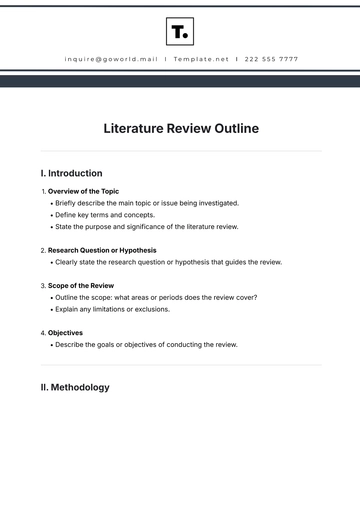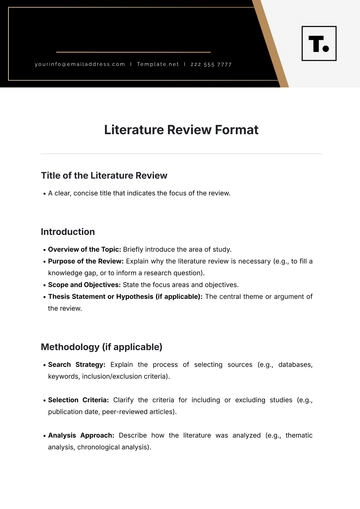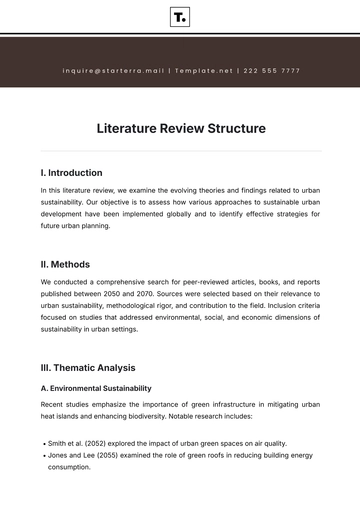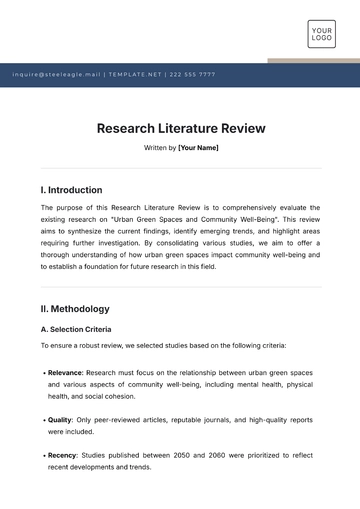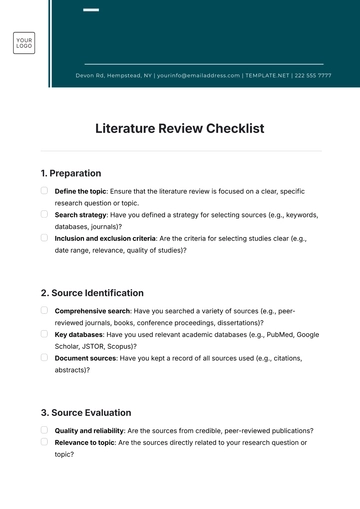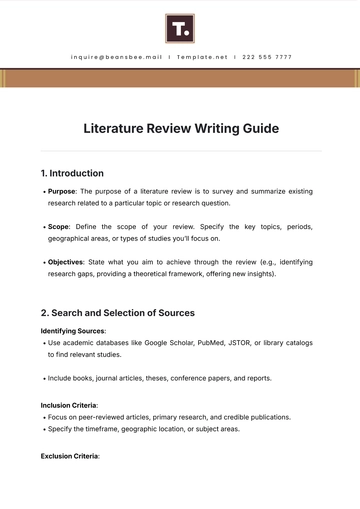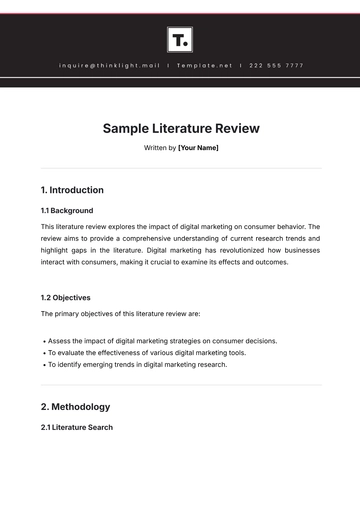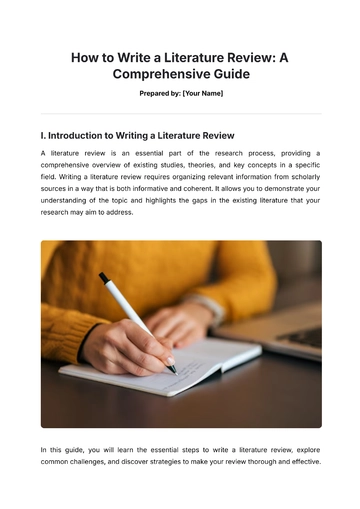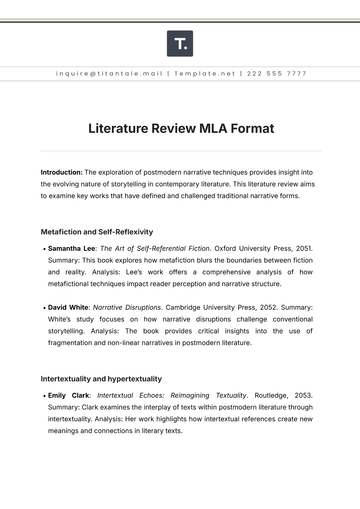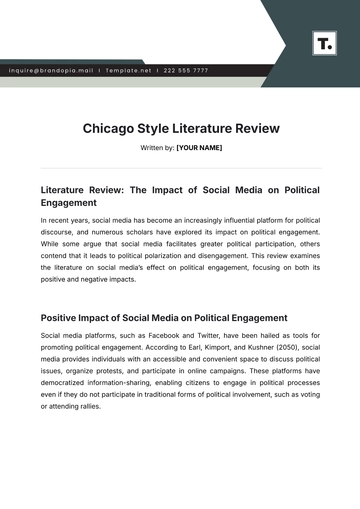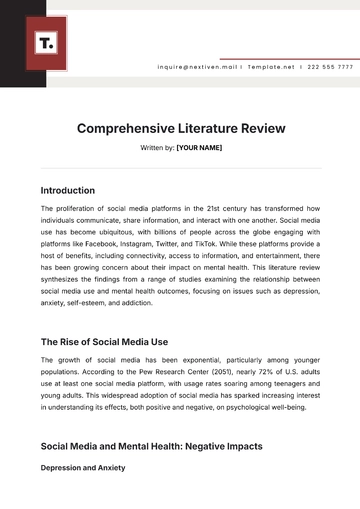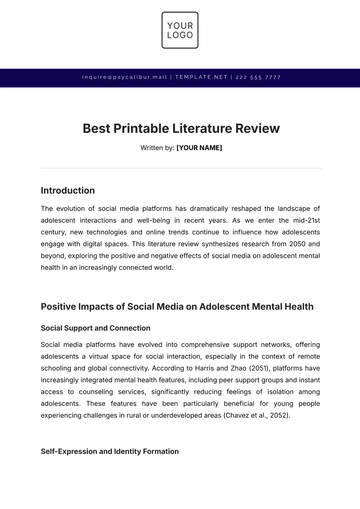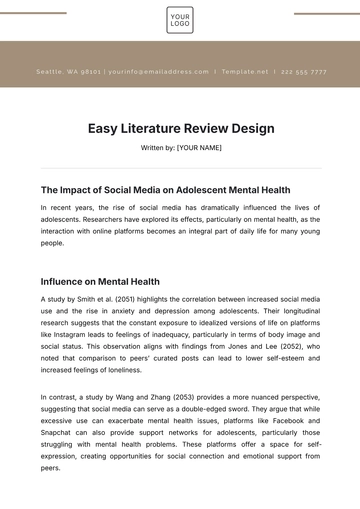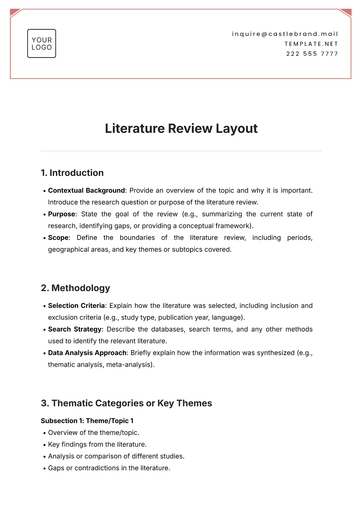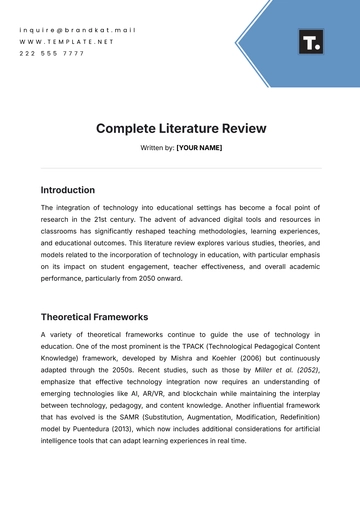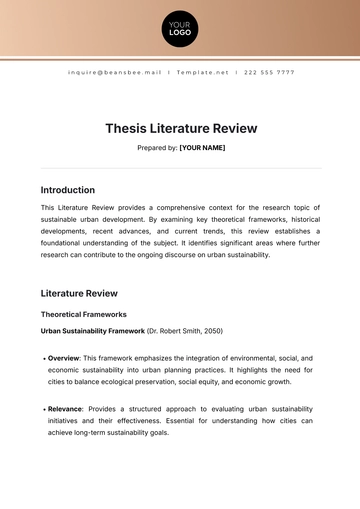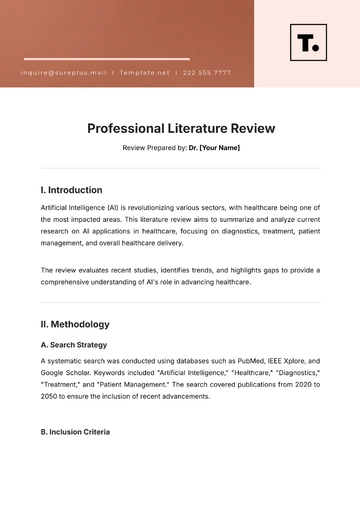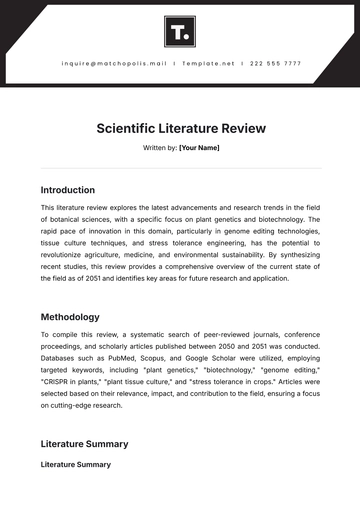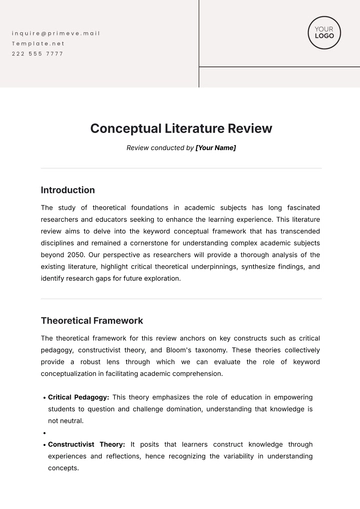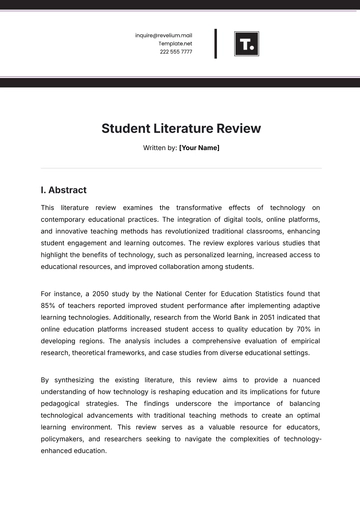Free Systematic Literature Review
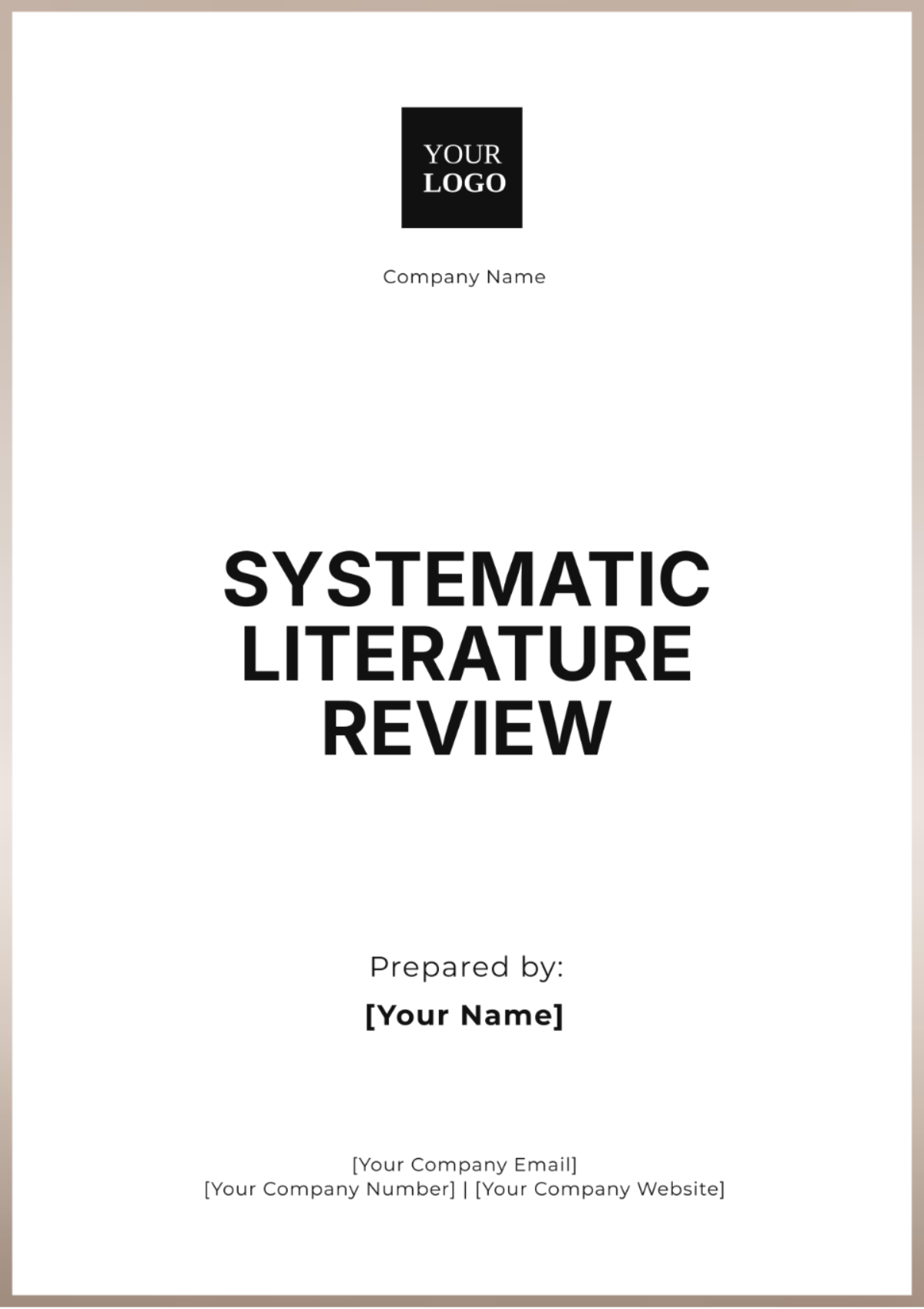
Written By: [YOUR NAME]
I. Introduction
The dynamic nature of education requires ongoing evaluation of teaching practices and their outcomes to ensure effectiveness and relevance. This Systematic Literature Review aims to synthesize and summarize research findings related to educational practices, including various teaching methods, the use of technology, and strategies for inclusivity.
This review is designed to provide educators, administrators, and policymakers with evidence-based insights to improve educational strategies.
II. Objectives
To evaluate the effectiveness of different teaching methods on student engagement and achievement.
To assess the impact of technology and digital tools on learning outcomes.
To review strategies for addressing diverse learning needs and promoting inclusivity.
III. Methodology
A. Search Strategy
A thorough and systematic search was carried out to gather relevant literature for this review. The following databases were extensively searched:
ERIC (Education Resources Information Center): A thorough and all-encompassing repository of information specifically designed to facilitate research and study in the field of education.
PsycINFO: A crucial and indispensable resource for conducting research and gaining insights in the fields of psychology and education.
Google Scholar: An inclusive search engine that comprehensively covers a wide variety of academic disciplines and fields of study.
Search terms included "educational practices," "teaching methods," "student outcomes," "technology in education," and "inclusive education." The search was limited to peer-reviewed articles published between 2050 and 2052.
B. Inclusion and Exclusion Criteria
Inclusion Criteria
Criterion | Description |
|---|---|
Peer-Reviewed Articles | Articles that have undergone peer review and are published in academic journals. |
Focus on Educational Practices and Outcomes | Studies specifically address teaching methods, learning outcomes, and educational strategies. |
Empirical Research | Research based on observed and measured phenomena, including experiments, surveys, and case studies. |
Published in English | Articles published in English language journals. |
Exclusion Criteria
Criterion | Description |
|---|---|
Non-Peer-Reviewed Sources | Articles and publications not subjected to peer review, such as popular media or non-academic websites. |
Irrelevant Articles | Studies that do not pertain to educational practices or outcomes. |
Non-Empirical Studies | Articles based on theoretical frameworks or reviews without original data collection or analysis. |
C. Data Extraction
Data extraction involved a detailed and systematic approach to gather key information from the selected studies. The following elements were meticulously recorded and analyzed:
Study Design: The type of research design used in each study, such as randomized controlled trials, cohort studies, case studies, or surveys. This helps in assessing the robustness and applicability of the findings.
Sample Size: The number of participants included in the study, providing context for the statistical power and generalizability of the results.
Interventions or Practices Evaluated: Specific teaching methods, technological tools, or inclusivity strategies that were implemented and assessed. This includes detailed descriptions of the interventions to understand their application and scope.
Outcomes Measured: The key metrics or variables that were assessed to evaluate the effectiveness of the interventions. This could include measures of student engagement, academic achievement, or other relevant educational outcomes.
Key Findings: Summarized results and conclusions drawn from the study. This section highlights the main discoveries and insights regarding the impact of the interventions or practices on educational outcomes.
D. Data Synthesis
Data underwent a process of synthesis through the application of thematic analysis, which was employed to thoroughly examine and extract common themes, patterns, and outcomes that consistently appeared across the various studies included in the research.
IV. Results
A. Teaching Methods
A review of 30 studies on teaching methods revealed:
Teaching Method | Impact on Student Engagement | Impact on Achievement | Notable Studies |
|---|---|---|---|
Direct Instruction | High | High | Johnson (2050), Smith (2051) |
Inquiry-Based Learning | Moderate | High | Lee & Chen (2052) |
Collaborative Learning | High | High | Turner (2051) |
B. Technology and Digital Tools
Analysis of 20 studies on technology use showed:
Technology/Tool | Impact on Student Engagement | Impact on Achievement | Notable Studies |
|---|---|---|---|
Interactive Whiteboards | High | Moderate | Garcia (2051) |
Educational Apps | High | High | Hughes & Lee (2052) |
Online Learning Platforms | Moderate | Moderate | Miller (2051) |
C. Inclusivity and Diverse Learning Needs
A summary of 15 studies on inclusivity strategies indicated:
Strategy | Impact on Inclusivity | Impact on Learning Outcomes | Notable Studies |
|---|---|---|---|
Differentiated Instruction | High | High | Martinez (2050) |
Universal Design for Learning | High | Moderate | Wright (2052) |
Culturally Responsive Teaching | Moderate | High | Kim (2051) |
V. Discussion
Teaching Methods: Inquiry-based and collaborative learning methods effectively engage students and boost academic achievement, creating an interactive environment that fosters deeper understanding and overall success.
Technology: Interactive whiteboards and educational applications have a profound and measurable effect on the level of student engagement and the overall outcomes of their learning experiences.
Inclusivity: Differentiated instruction and universal learning design are vital for meeting diverse student needs, accommodating various learning styles and abilities, and enhancing educational outcomes. These methods help educators create supportive and equitable learning environments.
VI. Conclusion
This review emphasizes the importance of diverse teaching methods, the integration of technology, and inclusive strategies to improve educational practices and outcomes. Future research should continue to explore these areas to refine and enhance educational approaches.
VII. References
Garcia, M. (2051). Interactive Whiteboards in Modern Classrooms. Technology in Education Journal.
Hughes, P., & Lee, J. (2052). Educational Apps: A Comprehensive Review. Digital Learning Review.
Kim, S. (2051). Strategies for Culturally Responsive Teaching. Multicultural Education Journal.
- 100% Customizable, free editor
- Access 1 Million+ Templates, photo’s & graphics
- Download or share as a template
- Click and replace photos, graphics, text, backgrounds
- Resize, crop, AI write & more
- Access advanced editor
Enhance your research with the Systematic Literature Review Template from Template.net. This customizable, downloadable, and printable template ensures a rigorous structure for your literature reviews. Editable in our AI Editor Tool, it provides a clear framework for organizing sources, methodologies, and analyses. Optimize your research process with this essential template.
